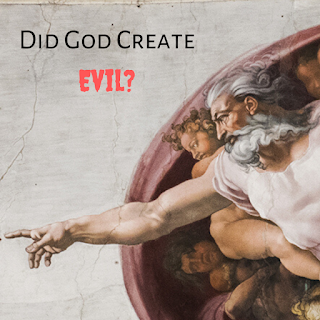If God created everything, does that mean that God also created evil?
This is a common argument that skeptics of the Bible and Christianity will make to defend their position that God does not exist. Some of the more biblically knowledgeable skeptics are also quick to point out Isaiah 45:7 as a case in point of both God's lack of moral character and a glaring contradiction in the Bible and Christian theology.
"I form the light, and create darkness: I make peace, and create evil: I the Lord do all these things."
~ Isaiah 45:7 King James Version (KJV) [Emphasis Added]
How can God be morally good yet also be responsible for creating evil? Is this an example of a biblical contradiction as the skeptic claims?
As so often happens with alleged Bible contradictions, the confusion stems from a linguistic misunderstanding. In this case, it is a misunderstanding of the word evil.
In Isaiah 45:7, the word translated as evil in English is the Hebrew word Ra` (רָ֑ע). The most common usage of Ra` is in regards to moral evil. However, as with English, this is not the only usage of the word. Ra` can also mean calamity, distress, trouble or even that something is simply bad. For example, in the New Living Translation of Lamentations 38-39 Ra` is translated as calamity while in Job 2:10 Ra` is used in reference to bad times or times of trouble and hardship. However, the King James translation of both of these verses translates Ra` as evil. This is because when the King James Bible was translated in 1611 the word evil could also mean calamity, disaster, or trouble, not just moral evil. However in modern English, evil refers almost exclusively to moral evil.
Understanding this, we have additional evidence within the text of Isaiah 45:7 to indicate that the broader meaning of Ra` is being used. In Isaiah 45:1-6 God is declaring himself to be the only true God. Verses 5-7 use contrasting imagery to showcase God's power and majesty. God alone created light and darkness. God alone makes peace. But what is the contrast to peace? Moral evil? No. Peace and security are contrasted by war and calamity. Not moral evil. This is why most modern English translations of the Bible substitute evil—which could mean calamity or disaster in 1611—with either calamity or disaster. Or, in the case of the New Living Translation, bad times.
"I create the light and make the darkness. I send good times and bad times. I, the Lord, am the one who does these things."
~ Isaiah 45:7 New Living Translation (NLT) [Emphasis Added]
So then, does Isaiah 45:7 teach that God creates moral evil? Not in the least. In fact, contrary to the arguments of the skeptic, the existence of moral evil in the world is not evidence against God's existence, rather it is evidence for God's existence.
Without an objective standard of morality, no one would be able to distinguish between that which is morally good and that which is morally evil. Good and evil would be completely subjective. Not only that, without being able to appeal to a higher moral standard, law and justice both become arbitrary. Whatever is morally acceptable to one person becomes that person's standard of good. One person may believe it is perfectly acceptable to beat and rob another. But without objective morality, no one can say for certain that such actions are morally wrong. Therefore, there cannot be moral evil without the existence of a transcendent standard of moral good that applies to all people for all time. The view posited by Christianity is that God is that standard. Since God is the standard by which we judge what is good, anything that is contrary to God's character is morally evil. This evil is what the Bible calls sin.
Because God is good, he cannot allow evil in any form to go unpunished. And since God's holiness is the standard of what is good, God's justice applies to everyone. God is the ultimate morally objective judge. This is why God sent Jesus to die for our sins. As the man Jesus Christ, God took upon Himself the judgment for the sins of all mankind so that through Jesus He could offer forgiveness and mercy to those who would be willing to turn from their sins and place their trust in Him. (Romans 5:6-11)
The existence of moral evil in the world and the fact that such evil is recognizable does not definitively prove that God exists. It is simply one more piece of evidence that points to God. And while God does not create moral evil, it is logically impossible for one to posit that genuine moral evil exists without also admitting the existence of objective moral good.

No comments:
Post a Comment